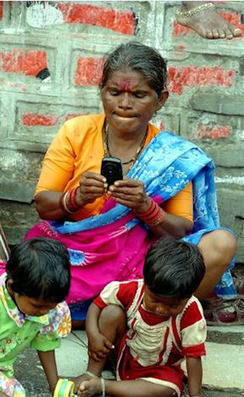Cell phones are the fastest spreading information technology (IT) in the developing world, with a penetration rate of over 61% [4]. Hence, there is a growing interest among governments, investors, banking industries, and retail giants like Wal-Mart to exploit this emerging channel of communication for offering services and expanding businesses to more than 3 billion poor consumers earning less than $2 per day. In response, a number of micro (individual), meso (community), and macro (regional/national)-level research inquiries and consumer surveys have investigated what makes cell phones a desirable and affordable technology for people earning less than $2 per day. These multidisciplinary studies and market surveys have revealed links between access to cell phones and socio-economic opportunities for disadvantaged populations from developing nations [9]. However, very few of the studies [1], [5], [10] have answered "why this link exists," and "how this link works."



 Your new post is loading...
Your new post is loading...









